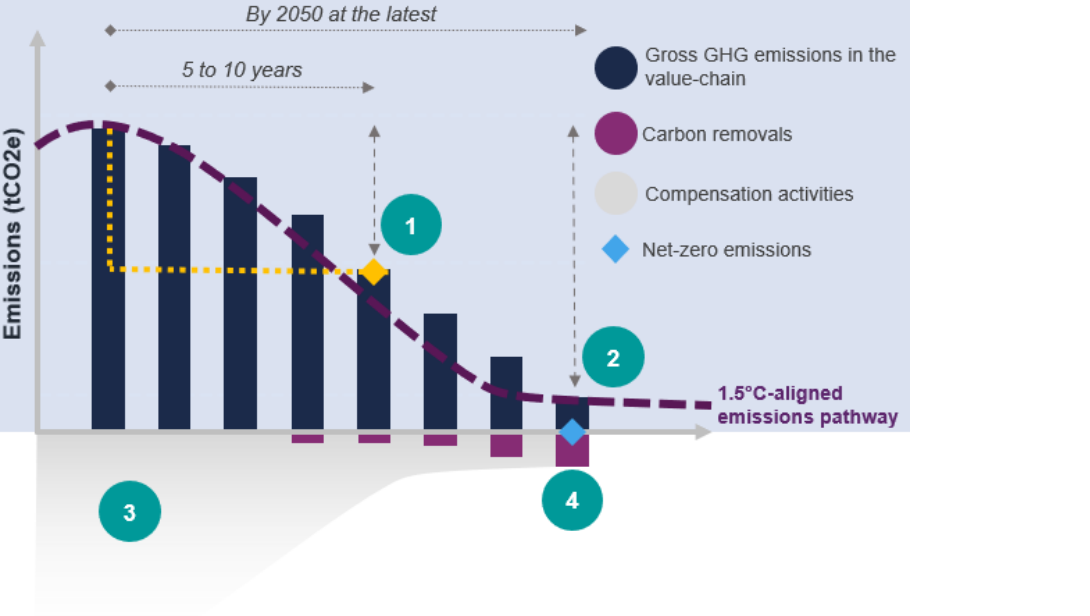Meeting Net Zero targets through sustainable procurement🔗
The need for science-based decarbonisation of supply chains
Supply chains and sustainable procurement will be key to meeting the 2015 Paris Agreement goals. Urgent climate action is needed from companies to keep global warming well below 2°C relative to pre-industrial levels and aim to limit the rise of temperatures to 1.5°C.
To mitigate the worst effects of climate change, global greenhouse gas emissions must be reduced by 50% by 2030 before reaching Net Zero by 2050. Reaching these goals will require aligning decarbonisation and procurement strategies with climate science.
Companies setting science-based targets will need to reduce emissions from their supply chains by at least 90% by 2050 if they are to meet the Science-Based Targets Initiative’s Net Zero Standard for corporate decarbonisation.
How companies can reach Net Zero
Near-term science-based target
Long-term science-based target
Additional and optional compensation
Balancing residual emissions with removals
The CDP estimates that Scope 3 emissions account for 75% of an organisation’s emissions on average. Given their overwhelming share in a company’s emissions inventory, significant focus should be put on supply chains.
In these efforts, procurement leaders will play a pivotal role in implementing sustainable procurement practices, setting up supplier engagement programs and ensuring their supply chain is aligned with a Net Zero future.
Embedding sustainability into the procurement function
Procuring sustainably means integrating environmental and social factors into purchasing decisions alongside typical decision-making criteria such as the cost, quality, and risks associated with goods or services.
From an environmental point of view, the CDP estimates that companies face up to $120 billion of risks within their supply chains. Through rigorous supplier assessments and risk forecasting, sustainable procurement can help organisations mitigate financial risks in their supply chain.
For procurement teams, cost-effectiveness will always remain a key priority in purchasing decisions. However, buyers can identify low-carbon alternatives to the goods and services they are purchasing at a cheaper cost.
Procurement leaders and their teams must be educated on climate change topics and pass this knowledge to their suppliers. Leveraging technology will make it easier to communicate with suppliers, exchange data, and evaluate the sustainable claims of existing and potential suppliers.
Supplier engagement programs will be essential to embed sustainability within procurement decisions and incentivise supplier climate action. To start the process, segmenting suppliers based on sustainability maturity and risk exposure can help narrow your focus.
Leveraging sustainable procurement in Net Zero strategies
In 2019, the UK became the first country in the world to set a Net Zero emissions target for 2050. As part of its decarbonisation journey, the government launched a Procurement Policy to ensure that bidders to government contracts would be aligned with their emission reduction ambitions.
The National Health Service (NHS), the UK’s publicly funded healthcare system, aims to become the world’s first Net Zero national health system. They have set targets to reach Net Zero for scope 1, 2 and 3 emissions by 2045.
Accounting for 4% of the country’s emissions, the NHS recognised that its suppliers would play a key role in reducing its carbon footprint. In 2021, the NHS approved a Net Zero Supplier Roadmap highlighting what is expected from suppliers from a climate point of view.
Since 2023, the NHS has required its suppliers to publish a Carbon Reduction Plan for their scope 1 and 2 emissions and a subset of scope 3 emissions. As of April 2024, bidders must also have published a Net Zero commitment.
This procurement strategy shows how national decarbonisation targets will impact sustainability strategies, lead to public and private sector collaboration in procurement and require engagement with suppliers to ensure sustainable procurement practices align with buyers’ Net Zero ambitions.
Enhancing your procurement strategy with expert partners
Equipoise is a technology-enabled consultancy with expertise in sustainable procurement. We help organisations of all sizes, sectors, and geographies mitigate supply chain risks and maximise opportunities through the following services:
Decarbonisation: Accurately measure your Scope 3 emissions in line with the Greenhouse Gas Protocol. Once hotspot areas are identified, decarbonisation initiatives are developed so you can prioritise emission reductions with suppliers.
Supplier Engagement: Benefit from structured and strategic engagement campaigns to understand and improve your suppliers’ sustainability maturity (including SBT setting), enhance relationships, and build resilience to climate change risks within your supply chain.
Capability Development: Develop your procurement team’s sustainability competencies through training, policy design and processes to ensure you have sustainable procurement capabilities to meet your company’s decarbonisation targets.
Digitalisation: Discover technologies that address your sustainable procurement pain points and meet your business requirements before implementing these solutions within your procurement processes.
Connect with Equipoise to build a business case for change, develop a roadmap to improve your sustainability performance and implement the changes you need to meet your sustainable procurement goals.




